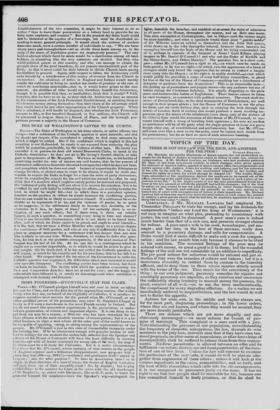THE DUKE OF WELLINGTON'S LETTER TO DR. CURTIS.
GLOBE—The Duke of Wellington in his letter admits, or rather affirms, two things—that a settlement of the Catholic question is most desirable, and that is should not despair, if he considered it calmly, to find some, measure by which it.thight he settled. But if the confidence which is implied in this last assertion is not ill-founded, he surely is not excused from maturing the plan Which lie conceives practicable, by the 'violence of other men. He surely can consider it in peace--he does not attend Brunswick Clubs, or speak 'at the Catholic Association ; he does not go to Mr. Irving's Scotch church, or take part in thepolemiCs of Mr./Ifacgiiire. Wd have no doubt too, as his facility of combining amidst the roar of cannon are well known; that he has powers of abstraction sufficient to divert his attention from speeches which he does not hear, and pamphlets which he does not read.. Instead of expecting the Ethiopian to change his skin, or absurd men to cease to be absurd, it would be more rea- sonable to expect the Duke to forget for a time the noise of party dissensions, while he considers-"the remedy for the evil which has caused its—But he may blink that if air:east:re which ought to satisfy parties be matured and proposed, he violence of pal•ty feeling will not allow it to receive fairattention. Yetis he ji:.tified by oily such belief in Withholding his efforts—in avoiding to make the trial, in which he 'might faillint in which there is a prevalent opinion, founded on the position in 'Which ht.stands-between the conflicting parties, IN:tin° one would be so likely to succeed as himself. -If a settlement be so de- sirable as • he represents it to be, and the violence of parties he as great as he supposes, is the settlement likely' to • become less desirable, or the i!,,tacles to it less, by lapse of time? Of late certainly there is no in- , Lotion of any, such effect; but.. if . there were, is there not infinite 1,1,aol, in such a question, in committing every thing to time and chance? ';'1;,:re is one favourable circumstance, which is not likely to be found here- , fret-, :Lull of which the Duke ought to be &End, and ought to avail himself— it is the fact, that vie have 'a Prime Minister who enjoys to a certain degree the confidence of 'b'oth' partied, and who at any rate is sufficiently firm in his place toe:propose measures for a settlement with less danger than any man who is likely to succeed him. When, therefore, he wishes to defer this gees- t km,. let hint look.at the probable consequences, if the next session of Par- liament was the last of his life. At his age this is a contingency which he ought not to consider improbable, or to which he would be averse to give its hie weight. On his death-bed, if he has not settled the Catholic question, he will rezret, as much for his country:End for his own fame, that lie has left it to ether hands. We suspect that if the intention of the Government to settle the Catholic question was expressed, the difficulties which now surround it would very-Speedily disappear. The conflicting parties have been violent, but there has been no mediator. The facility with which the question concerning the Test and Corporation Acts has been set at rest for ever; and the happy re- sults.which have followed it, is surely no discouragement when mediation is attempted' with honesty and firmness.


















 Previous page
Previous page